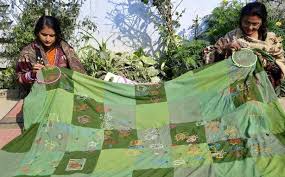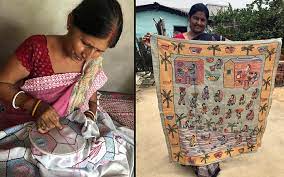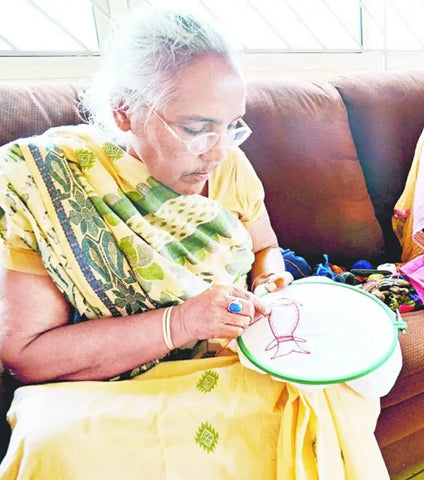Introduction of Bihar Sujani Embroidery:
Sujani, or Sujini art, is one of the better known and respected embroidery methods known to India, and it originated in Bihar, specifically, the Bhusara village. Initially, when it was brought into the market, it was considered to be a form of quilting. Old sarees and other cloth items were reused to be made into a sort of canvas, or platform, where the fabric was folded multiple times, on which simple stitches were etched to give it a new look, and enhance the older material. Nowadays, even Rajasthan is known for indulging in this art, where the southern part of the state uses it to make sarees and dupattas, among other clothing items and even home furnishing.
Details of Bihar Sujani embroidery:
History of Sujani Embroidery:
Sujani embroidery came into existence around the 1920’s, and was initially only practiced by Rajput women and their groups. When we break the word into two parts, we see that ‘Su’ means facilitating, while ‘Jani’ means giving birth. It started off with the work of women, who were meant to just fulfil household chores, give birth to children and look after their families. Later on, they developed their skills for embroidery further, and started using Sujani to make quilts and blankets for new-borns and younger children, by stitching colorful patches of older clothes together, and then performing the embroidery patterns with colorful threads and creating motifs and designs on it. 
Facts and origins of Sujani Embroidery:
The central origins of this craft came from ancient practices where old cloth pieces were stitched together for newborns, as something to drape them in, as well as be used as a blanket or quilt to provide them with warmth and comfort. Various motifs, like the sun, clouds, animals and nature motifs were etched onto the cloth in an attempt to invoke a goddess who was known as “Chitiriya Maa”, and was known as the “Lady of Tatters”, symbolic of the attempt that was being practiced here. The motifs were used to symbolize life, and use symbols of fertility and wealth, to evoke blessings from the gods.
The process involved in partaking in this embroidery starts with the collection of raw materials to be used as the base fabric, after which designs and ideas are traced onto the base with a tracing wheel, as well as a tracing sheet. This step is done so as to give the ‘karigars’ a base or a map to follow when they start the embroidery to create their imagination. The next step is to start fine running stitches onto the patterns, and use of mainly black, or brown threads to outline the motifs that were previously etched. Colorful threads are used to stitch and fill in the designs and motifs to form the final product. Some of the essential materials required for Sujani are needles, threads, scissors, teaching sheets and wheels, as well as blue chalk, among many others. 
Sujani Embroidery on iTokri:
iTokri has been an avid supporter of Sujani embroidered fabrics and has and hosts a number of items that have been worked on with this embroidery. These are mainly cloth pieces like scarves and other such products. Some of these are Handloom pure tussar silk stoles, and these come in a lot of variety, one of the most unique being the Light green, special Sujani hand embroidered stole. These stoles add a splash of vibrant color to any outfit, traditional or western, and brings with it a touch of culture and generational creation. 
Future of the Sujani craft:
Over the years, Sujani embroidery has been on down-low and has been overshadowed by other embroidery forms that became more popular, such as Madhubani. But the essence of it is still very prevalent in the Indian handicrafts industry. The women of the rural communities of Bihar still continue practicing this craft, using combinations of running and chain stitches. Some of them even use these as sources of livelihood, to earn for themselves and their families, and contribute to their households in the small ways that they can. The production of Sujani embroidery is done in about 15-20 villages of India in the present time, and is heavily performed by women that are not allowed to leave their households for external work, not only as a pastime, but also to make them feel purposeful and worthy of the craft.
Blogs you might also like:
Bengal Kantha Embroidery
Bandhani Tie & Dye
Painting with thread- The art of embroidery
REFERENCES
https://www.itokri.com/search?q=sujani
 Verified Purchase
Verified Purchase


































































































































































































Leave a comment (all fields required)